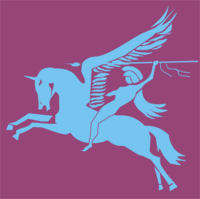13th Parachute Battalion (TA)
| 13th (Lancashire) Parachute Battalion | |
|---|---|

Cap badge of the Parachute Regiment
|
|
| Active | 1943–1946 1947–1956 (Territorial Army) |
| Country |
|
| Branch |
|
| Type | Infantry |
| Role | Airborne forces |
| Size | Battalion |
| Part of | 5th Parachute Brigade |
| Nickname(s) | Red Devils |
| Motto(s) | Win or Die |
| Engagements |
Normandy Battle of the Bulge Rhine crossing |
| Commanders | |
| Notable commanders |
Lieutenant-Colonel PJ Luard, DSO OBE |
| Insignia | |
| The emblem of the Second World War British Airborne Forces, Bellerophon riding the flying horse Pegasus |  |
The 13th (Lancashire) Parachute Battalion was an airborne infantry battalion of the Parachute Regiment, raised by the British Army during the Second World War. The battalion was formed in May 1943 by the conversion of the 2/4th Battalion, South Lancashire Regiment to parachute duties and was assigned to the 5th Parachute Brigade in the 6th Airborne Division.
In June 1944, the battalion took part in Operation Tonga, the invasion of Normandy on D-Day, and the 6th Airborne Division advance to the River Seine, before being withdrawn back to England. Three months later they were sent to Belgium to help counter the surprise German Ardennes offensive, which became known as the Battle of the Bulge. Later, in March 1945, the battalion took part in the last airborne operation of the war: the River Rhine crossing in Germany. After the war in Europe ended, they were sent to India to conduct operations against the Japanese Empire, however, the war ended before they could begin. As a result, the battalion was sent to British Malaya, Singapore and Java to help disarm the Japanese occupiers and restore law and order. While in the Far East 252 men of the battalion were convicted of mutiny and soon afterwards, in May 1946, the battalion was disbanded.
...
Wikipedia
